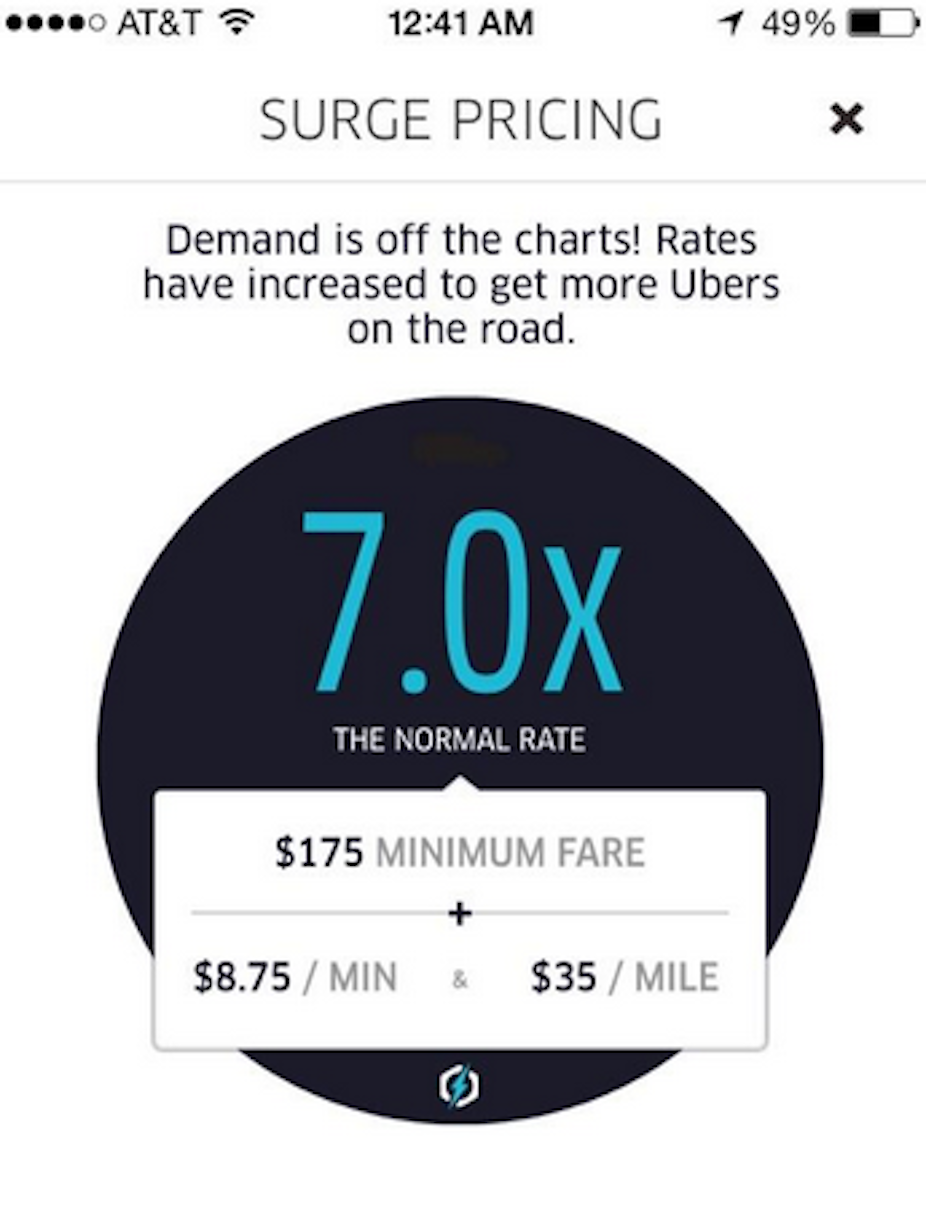New Years Eve has come and gone and with it the annual discussion regarding whether Uber’s ‘surge pricing’ is justifiable (for example, here in Slate and an excellent set of points from Tim B. Lee at Vox). For the uninitiated, ‘surge pricing’ occurs when Uber’s algorithms automatically raise the price of rides to consumers by multiples (2, 4 and even 7 times) over their normal price. Not surprisingly, consumers hate this while drivers love it.
Previously, the argument has been about transparency. The price spikes seemed to happen without warning and with variable magnitudes. For those who headed out for a night on the town, they might find themselves with unexpected costs of getting home. Uber (and the response of many economists I might add) is that at least their passengers could get home. However, Uber did receive the message and this year was at pains to inform its customers when price spikes were likely. Moreover, they allowed people to receive an estimate of just how much they might pay. Suffice it to say, transparency was achieved.
Of course, this hasn’t really hit at the argument. Planning helps but as airlines have found, consumers really aren’t happy about price variability. In one sense, it is hard to dismiss their distress. When Sydney faced a hostage crisis recently, Uber’s algorithms initiated a surge. There was outrage that Uber was exploiting a fearful situation. Uber, itself, did not appear to intend that and quickly made all fares out the city free. But economists were concerned that such moves may yield to worse outcomes. After all, the point of surge pricing is to encourage more drivers to work and in doing so help in a crisis. But as Tim Sullivan wrote, few (economists included) would teach their kids to demand more from people who are desperate, and so we should not be surprised when people react negatively to these price spikes.
The issue is that the fundamental problem of supply being outweighed by demand continues. Price surges are one way of getting the balance right and, indeed, when there is lots of transparency and little uncertainty these work to do so without large fluctuations. The other way is to have excess capacity. As I wrote in HBR a few years ago, what if there is a guarantee of price stability for consumers but Uber uses prices to still induce drivers? Consumers pay more on average per ride but are insured against price spikes. Drivers are still paid the same. In that situation, there is a loss in static efficiency (due to consumers demanding more during peak periods and less otherwise) but the consumers get insurance. Moreover, Uber could offer price stability as an alternative product. Then surely it is the consumer’s own fault for not purchasing it, blurring the moral lines somewhat.
Such schemes have not been tried because they can be inherently difficult to manage. Then again, the current system is no picnic so surely experimentation is warranted.
But there is a final wrinkle. When surge pricing is in effect, some consumers who remember what it is like not to get a ride would surely be happier than before. Yet this doesn’t seem to be the case (of course, maybe there are some but, apart from economists, I haven’t seen much evidence of it). This suggests to me that the moral outrage is different from the one Sullivan is suggesting. It is not about the “right” thing to do but, instead, that during surge price times, drivers are earning returns about their opportunity cost. That, of course, is the point. But what they are getting is a bonus and the bonus has to (and I don’t have time to get into the full economics here) pay them more than a normal return. In other words, the system is designed not to pay drivers to just do their job when they would be at a party but instead to give them more in order to ration demand. It would not surprise me at all if we had instinctual emotional reactions to situations where the power has shifted against us and that power is being exercised.

